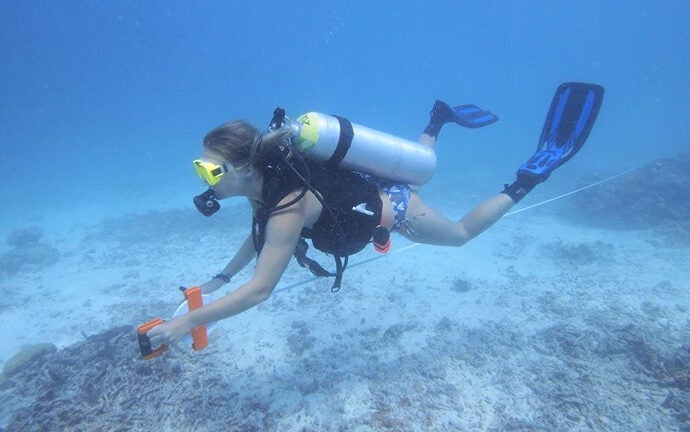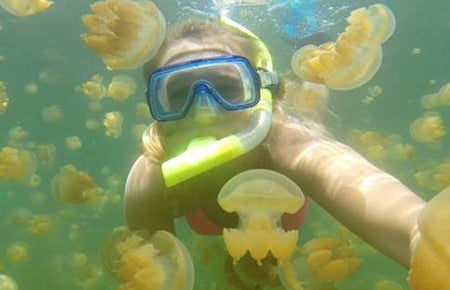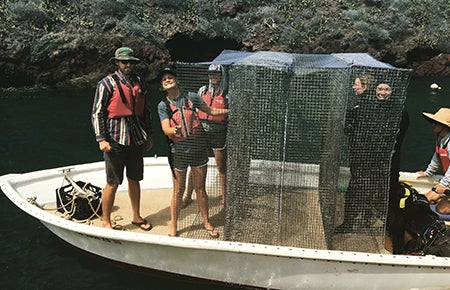
Senior pursues her passion for scientific diving and marine research
As her father tells it, Madison Guest had a hard time during swimming lessons as a child because she always wanted to dive down under the water rather than swim on the surface. It would prove to be an auspicious affinity.
Guest, a Long Beach, Calif., native and lifelong ocean and nature lover, transferred from a community college to USC — her “dream school”— in 2013. She soon declared an environmental studies (ENST) major and immediately signed up for the Catalina Semester program taught by David Ginsburg, associate professor (teaching) of environmental studies. The course introduces students to scientific ocean diving and coastal ecology through laboratory and field studies on Catalina Island, Calif.
“On Catalina we did about a month’s worth of diving training,” she said. “It was like nothing I’d ever experienced before, but it felt so natural to me. Ever since then I’ve been pursuing diving and related research.”
Unique opportunities abroad
Since then she has taken advantage of two Problems Without Passports (PWP) courses. “Integrated Ecosystem Management in Micronesia” (ENST-480), also taught by Ginsburg, takes students to Palau for three weeks to collect data on the comparative health of coral reefs that have been protected from fishing practices. Students must first do training and get their scientific diver certification at USC.
“That was my favorite USC course by far,” Guest said. “Palau is the first place to protect all their international waters and has the first shark sanctuary in the world. It was also my first time going abroad, so it was a huge step, but I absolutely loved it.”

An experienced scientific research diver, Madison Guest is now working on her Divemaster certification.
“The Role of the Environment in the Collapse of Human Societies: The Ancient Mayan Civilization” (ENST-485) brought her to Belize to conduct research on the impact of climate change on historical societies.
“Being in the jungle is the total opposite of what I’d been doing,” she said, “but I love the ENST major because you can do that — you don’t have to go in only one direction but can explore all avenues.”
Mentored research closer to home
This summer Guest is participating in the “Coastal Ocean Systems and Sustainability” Research Experiences for Undergraduates (REU) program at the USC Wrigley Marine Science Center. The REU program, which just received renewed funding from the National Science Foundation, brings a group of undergraduate students to Catalina Island for 10 weeks to conduct individual research projects. Designed to encourage STEM career paths and to help students get into competitive graduate research programs, students work with the guidance of faculty mentors and “near-peer” graduate student mentors doing related research.
This summer’s USC Dornsife faculty mentors include Karla Heidelberg of biological sciences and environmental studies, and director of the USC Environmental Studies Program; Sergey Nuzhdin of biological sciences; Lynn Dodd of religion and director of USC Dornsife’s interdisciplinary archaeology undergraduate major; and Douglas Capone of biological sciences, holder of the William and Julie Wrigley Chair in Environmental Studies.
The extremely competitive program — eight students were selected from 200 national applicants — provides undergraduates like Guest with hands-on research experience, the opportunity to present their research to the local scientific community, academic and career advising, professional development workshops, and field trips to explore the island’s unique ecosystems.
“The REU is such a productive program in training the next generation of scientists,” said Diane Kim, undergraduate programs administrator at the USC Wrigley Institute and REU collaborator. “Along with the independent research projects, we provide research seminars and professional development workshops on topics such as science communication, how to apply to graduate school and CV development.”
Putting it all together

Part of a large-scale research effort, Madison Guest stands with the cages used to analyze sex ratios of Goby fish populations in 49 different reef areas around Catalina Island.
By now an experienced diver, Guest is working on her Divemaster certification. Her interest in marine conservation and fisheries, sparked during her Catalina semester, informed her REU research project. She is working with faculty mentor Mark Steele, associate professor of biology at California State University, Northridge to study the Bluebanded Goby, a fish capable of changing its sex. Guest is investigating the effects of size-selective mortality on these fishes as well as focusing on an ongoing eelgrass study and general marine fish ecology.
“Not only do I get to dive and get all that additional experience, but also I get lab experience,” she said. “I’m conducting my own lab experiment now, and I’m pretty excited about it.”
Ginsburg, one of Guest’s academic advisers, asked her to serve as a teaching assistant for his ENST-480 class this past Spring.
“Maddie is exactly what we intended in the sense that we offered the scientific diving class on Catalina three years ago, and she took it and from there has really focused her curriculum on marine and environmental issues,” he said. “Now it’s culminating with an NSF-funded research experience, which is just what you want for your students — you teach them something and it really builds an interest and they end up using it.”
The REU program has inspired Guest to attend graduate school to further pursue diving and marine research.
“USC has encouraged me to pursue what I love and what I’m passionate about,” Guest said. “I was always passionate about the environment and the ocean, but USC also taught me to expand and go beyond my comfort zone. ENST is a really tight-knit group and offers so many avenues to explore and opportunities to experience. It’s really shaped me into the person I wanted to be.”
To learn more about the REU program and see photos of students in the field, visit facebook.com/USCWiesREU.